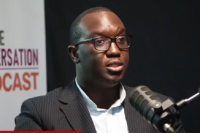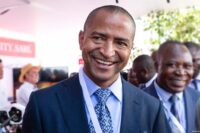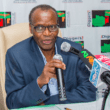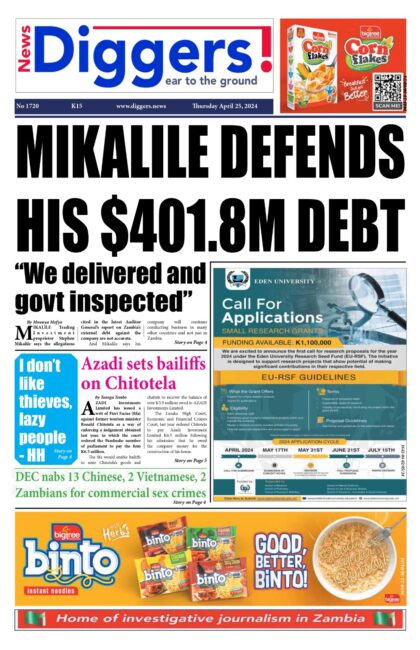Speaking upon his return to Zambia from the AU conference in Addis, President Edgar Lungu asked the nation to bare with him as his government investigates the fire that gutted Lusaka City Market recently.
“If it means taking measures which are unprecedented we will do just that, some people will have to lose their rights. People who have lost their property have lost their livelihoods. So if I become a dictator for once bare with me,” said the President.
The million dollar question on the minds of Zambians must be: How much will we have to bare with the declared Threatened State of Emergency, or the use of other such unilateral powers held by the President?
In public discourse, it’s often forgotten that majority of the citizens are under the age of 34. So in the interests of enlightening that great majority of Zambians, I consulted the invaluable and must-read memoir* of Valentine Musakanya, the visionary technocrat and statesman.
As an officer in the colonial administration, Musakanya was involved with States of Emergencies, and ironically, he was later detained under those very same powers during the totalitarian rule of first President, Kenneth Kaunda.
Musakanya described himself as “probably the most qualified and experienced in Zambia in the application and administration of PPSR [Preservation of Public Security Regulations] and of the importance of the Article in the Constitution enabling the Executive to declare a State of Emergency. As an administrative civil servant in the Colonial Government it was my duty to help implement the regulations the few times that they were in force. Consequently I was privy to the limitations and effects.”
The State of Emergency enacted during the suppression of Alice Lenshina and the Lumpa Church in 1963-64 was still in place when, as a Member of Parliament, Musakanya refused to vote for the open-ended extension of those emergency powers that was approved in 1969.
“Detention laws are only found in primitive political systems, that is where the minority […] or an unpopular government is suppressing the majority in order to remain in power,” Musakanya said during his own politically-motivated detention.
“The British used [detention laws] to suppress the uprisings of native peoples, but […] the Government invested the declaration of emergency in the Sovereign and ensured that a ‘good’ reason existed for any declaration, and that it was limited in duration.”
This last point―the limited duration of States of Emergency―was of critical importance during the period of colonial rule, according to Musakanya:
“Where a Governor declared a State of Emergency and did not lift it quickly or had it declared precipitately, he was usually sacked or dismissed; such was the fate of Sir Arthur Benson in Northern Rhodesia, and the Governors of Nyasaland, Kenya, Cyrus […] A Declaration of Emergency was considered so serious that those who sought to apply it knew that penalties could be applied to them.
“The situation had to be serious enough to justify an emergency,” Musakanya explained. “Isolated riots would not be enough. Even a threat to the Government as such would not demand a State of Emergency […] only a genuine threat to the public. [Detention law] therefore is not intended for the Government to continue to preserve itself in power but to protect the public, as the [name of the Preservation of Public Security Regulations] implies.
“The point is that the areas where the PPSR are applied are such that every reasonable and informed citizen will have concluded that the security of the state and persons is and will continue to be at risk unless special powers are applied,” Musakanya continued.
“The provision under PPSR that a person detained be given reason thereof within fourteen days is an assumption of how serious the ‘situation’ is. I said I was involved in some colonial emergencies. The practice was that as soon as people were rounded [up] and ‘compounded’ the screening process had to take place — even working through the night — releasing some, preparing charges for those to be charged and grounds for those to be detained.
“A large operation of between 300-500 would be over in a week. Now, where one or even ten persons have been deliberately picked from their homes, surely the authorities should have grounds or reasons fully assessed even before they start off. If they wait for fourteen days, they are surely not explaining but manufacturing grounds, or incubating witnesses.”
Ironically, Musakanya wrote these words and spoke them in court in 1981, during his own trial on treason charges stemming from the failed coup in 1980.
“I am detained under a PPSR arising out of a Declaration of 1964 of a situation regarding Lenshina in Chinsali and Lundazi […] It is that situation which has been extended to date. How am I related to that situation? Surely I am not. If the AG [Attorney General] insists that PPSR must apply, the Courts must ask him to prove it because if the ‘notorious situation’ is absent the grounds are vague in their entirety.”
Speaking at court from the prisoner’s box, Musakanya continued: “For your Lordships further information, the spirit behind making use of emergency powers […] is that of Parliamentary democracy, which wishes to ensure liberty even at the risk of anarchy. Such a condition is still preferable to fascism or dictatorship which takes over when such powers become routine as it has turned out in Zambia.”
Now, as the nation awaits the outcome of President Lungu’s invocation of Article 31, it’s worth remembering the history of States of Emergencies in our past.
Among all the reasons for caution and restraint―the fact that a State of Emergency will destroy our economy, cripple tourism for years to come, make an international mockery of our country, and force yet more Zambians into inhumane prisons that are already full to bursting with record numbers of inmates―Musakanya’s defense of democracy is worth recalling after 36 years:
“We believe in the democracy of the people and not the minority called One Party; in utmost freedom of the individual ― even at the risk of anarchism. Only a nation of free individuals can advance. Any form of democracy is preferable to fascism or electoral dictatorship: the conditions now current in Zambia.
“Accordingly, a multiparty system and opposition are not only necessary but are inalienable rights of man to enable him to express his views and contribute to his own advancement.”
* The Musakanya Papers, Edited by Miles Larmer, copyright Kapumpe Musakanya












